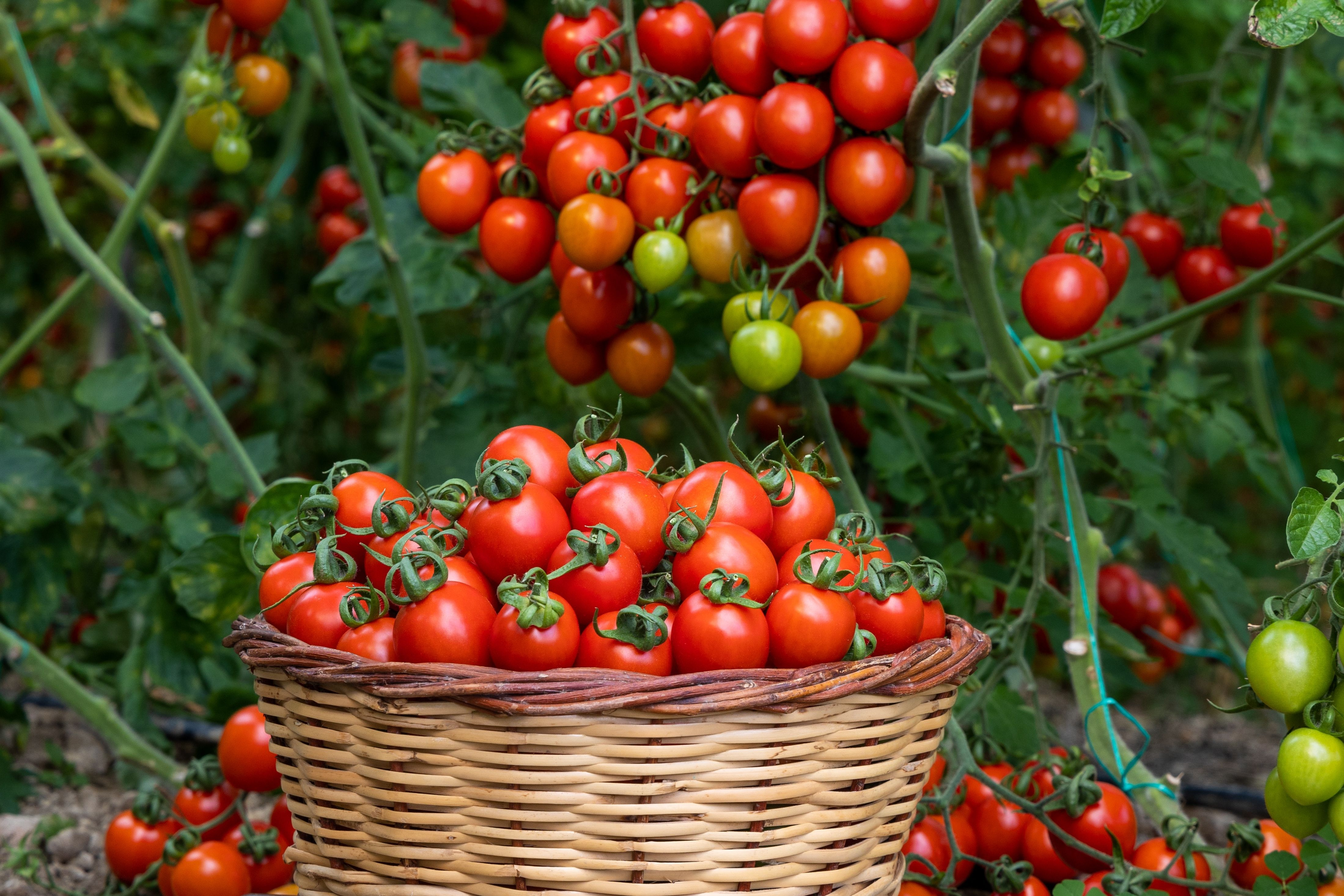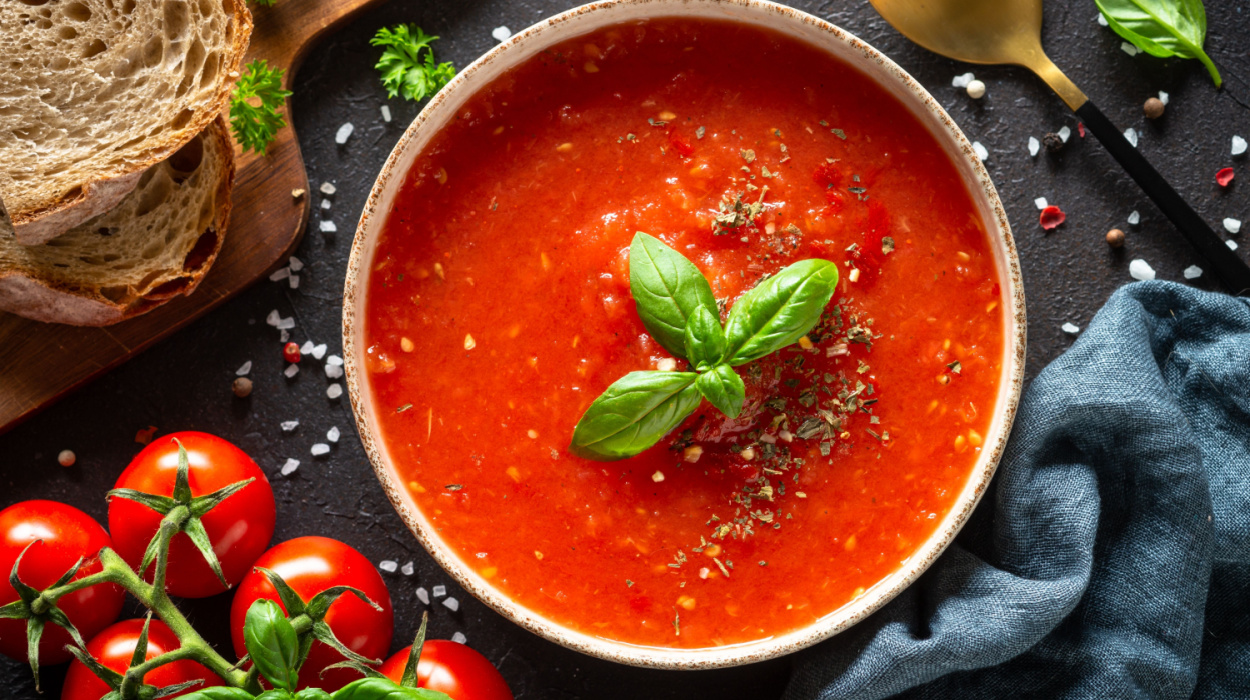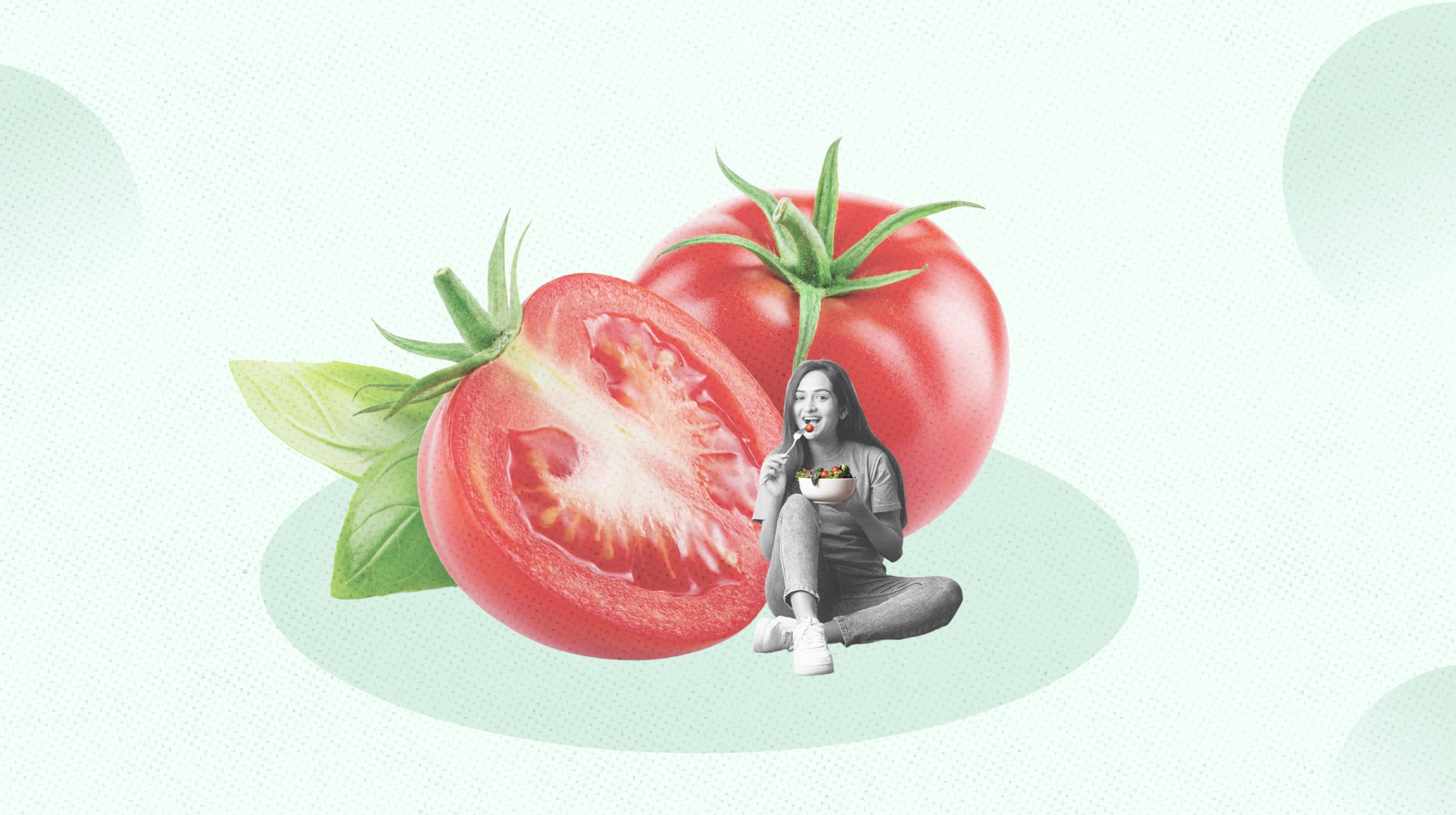Tomatoes, though often considered a vegetable, are a fruit that comes in many varieties – cherry, grape, beefsteak, plum, cocktail, Roma, heirloom, on the vine – and are as versatile as they are healthy. Grown from the Solanum lycopersicum plant, they are the edible berries of the tomato plant, enjoyed by many cultures all over the world. Tomatoes are used in a variety of dishes from salads to pizzas and are often recommended to include in one’s diet for health benefits[1] ranging from cancer prevention to heart health. Let’s dive in to explore the health benefits of tomatoes.
Tomato Health Benefits
- Helps protect the brain
- Helps protect the heart
- May reduce cancer risk
- Helps prevent constipation
- Helps prevent type 2 diabetes
- Great for the immune system
- Can protect the skin
- Good for the eyes
8 Benefits Of Tomatoes
Help Protect The Brain
Eating tomatoes provides lycopene and beta-carotene, antioxidants that, among other things, can help prevent damage to brain cells. For best results, eat your tomatoes (and all your veggies) with a side of fat, such as olive oil or grass-fed butter – this allows the nutrients to be better absorbed and assimilated in the body. Healthy sources of fat feed the brain as well, so together, tomatoes and fat boost brain function.
Help Protect The Heart
The lycopene[2] and beta-carotene in tomatoes may have protective properties for the heart. Studies have shown that some individuals who have lower levels of both lycopene and beta-carotene in their blood have an increased risk of heart attack, stroke, or heart disease. Other studies suggest that lycopene may have a positive effect on cholesterol, as well (lowering LDL “bad” cholesterol).
May Reduce Cancer Risk
Some studies[3] have correlated tomatoes with fewer cancers of the prostate, lungs, and stomach. The lycopene is thought to play a role in this, as it is a powerful immune system supporter. Another factor may be the carotenoids in the medium tomato, which may prevent breast cancer in some women.
Help Prevent Constipation
Ripened tomatoes can have a laxative-like effect thanks to their high concentration of water combined with their fiber. Therefore, increasing tomatoes in the diet may relieve occasional constipation, but as with any food or supplement used to “get things going”, it’s best to introduce it slowly and in small amounts.
Help Prevent And Reverse Type 2 Diabetes
Raw tomatoes are a low-sugar, non-starchy fruit with a low glycemic index (GI). This means One medium tomato is less likely to cause a blood sugar spike, even when eaten alone. Including tomatoes in your diet can help reduce blood sugar spikes which can eventually lead to type 2 diabetes and are also part of a great eating approach that can reverse the condition.
Great For The Immune System
Vitamin C and lycopene are two powerhouses for boosting immunity. As an antioxidant, lycopene in particular works to undo damage to cells caused by free radicals. When left unchecked, this cellular damage can harm the immune system, leading to everything from the common cold to various types of cancer.
Can Protect The Skin
Tomato juice offers value in the way of skin health, as well. It’s thought that the compounds in tomatoes, including lycopene, can help protect the skin from sunburns. Additionally, the vitamin C in tomatoes works to reduce the damage caused by free radicals, which can cause fine lines, wrinkles, and age spots.
Good For The Eyes
The lutein and zeaxanthin[4] in tomatoes may have a protective feature against damage caused by blue light from electronics. Some research also suggests that tomatoes are linked with less likelihood of developing age-related macular degeneration, which is a common cause of blindness.
Nutrition In Tomatoes

Tomatoes have considerable nutritional value, but the exact amount of nutrients varies depending on the variety of tomatoes, their size, and their ripeness. On average, 100 grams of red, ripe tomato (one raw tomato) contains less than a gram of fat and 18 calories. Additionally, there are 5 milligrams of sodium, roughly 4 grams of carbohydrates, 1 gram of fiber, and less than a gram of protein.
Cooked tomatoes have high amounts of folate, vitamin K, vitamin C, and potassium, as well as beta-carotene and lycopene – an antioxidant[5] most well-known for giving tomatoes their red color, helping to reduce the risk of disease; and maintaining healthy blood pressure.
How Often Can We Eat Tomatoes In A Week?
Tomatoes are a healthy and safe food without any restrictions on how much or how often you can eat them. That being said, the body thrives on variety, so if you’re eating a lot of tomatoes, make sure to swap them out occasionally for different fruits and vegetables.
If you are sensitive or allergic to tomatoes or suffer from acid reflux, you may do better to avoid or limit them. Otherwise, it is safe to eat them as often as desired.
Recommended Recipes With Tomatoes
Homemade Pasta Sauce
Why buy bottled sauce when you can make your own? You’ll need:
- 2 tablespoons extra virgin olive oil
- 1/2 medium onion, finely chopped
- 1 small carrot or 1/2 large carrot, finely chopped
- 1 small rib of celery, including the green tops, finely chopped
- 2 tablespoons chopped fresh parsley
- 1 clove garlic, minced
- 1/2 teaspoon dried basil or 2 tablespoons chopped fresh basil
- 1 (28 ounces) can whole tomatoes, including the juice or 1 3/4 pound fresh tomatoes, peeled, seeded, and chopped
- 1 teaspoon tomato paste
- Kosher salt and freshly ground black pepper to taste
First cook the onions, carrots, celery, and parsley until soft, then add in the garlic, salt, pepper, basil, tomatoes, and tomato paste. Keep cooking until all ingredients blend together and let it simmer for 15 minutes. You may wish to put the sauce through a blender or food processor to make it smoother.
Summer Salad
No salad would be complete without tomatoes! There are so many different types of salads and tomatoes can liven up all of them. You may wish to add whole grape or cherry tomatoes to your salad or cut up larger tomatoes into cubes or slices. Enjoy with an olive oil-based dressing.
Fried Green Tomatoes
Fried green tomatoes are a southern-inspired dish, made with unripe red tomatoes (which are green). Slice the tomatoes and coat the slices in seasoned flour or breading of your choice. You will need to make the breading with bread crumbs, eggs, and/or cornmeal. Season as desired. Once coated in flour or breading, you’ll need to fry them. With an oil of your choice, fry the sliced tomatoes in a pan until crispy golden brown on each side.
Tacos And Burritos
Similar to salads, adding diced or chopped tomatoes to a burrito or taco can give it an extra boost of taste and nutrition.
Tomato Soup

Nothing’s better than homemade tomato soup on a cold day. You’ll need:
- 3 lbs Vine-ripened, naturally sweet tomatoes
- 1/s diced onion
- 5 cloves peeled and chopped garlic
- 2 tbsp olive oil
- ½ tsp fine sea salt
- ¼ tsp freshly ground pepper
- ¼ cup fresh basil
- 2 tbsp salted butter
- 2 tbsp all-purpose flour
- 1 tbsp granulated sugar
- 1-quart vegetable or chicken broth
- ¼ cup heavy cream (optional)
Combine tomatoes, onion, and garlic in a large bowl and toss the ingredients with olive oil, salt, and pepper then stir well. Spread the tomato mixture onto a baking sheet in a single layer and set it to roast for 15 minutes. Remove from the oven, stir, and roast for another 15 minutes.
Once everything is roasted, put the contents into a blender and add the fresh basil. Blend the mixture at a high speed until everything is smooth.
Next, melt butter in a pot on medium heat. Once the butter is melted, add the flour and whisk them together. Cook until it turns golden brown. Once done, add the broth and sugar to the pot and whisk to combine everything.
Now grab the tomato mixture and add it to the pot. Whisk everything together. If you prefer a creamier soup, you can add some heavy cream, but it’s not necessary. Cook on medium heat for 15 minutes, then add salt and pepper to taste.
Conclusion
Though tomatoes are grouped in with vegetables, they are technically a fruit and one of the healthier ones at that! Low in sugar and calories but high in antioxidants, tomatoes offer a lot in the way of disease prevention, brain function, and immunity. Tomatoes come in several different varieties and can be used in several ways to make tomato-based dishes or as an extra ingredient to liven up other dishes. This makes tomatoes a versatile and delicious staple to any diet.
Frequently Asked Questions
Nightshades are a type of plant food that grows at night, rather than during the day. Nightshades include tomatoes, white potatoes, eggplant, and peppers. These foods can irritate some individuals, particularly those with certain GI or autoimmune conditions. If you are sensitive to other nightshades, you may also be sensitive to tomatoes, but you’ll need to test it out for yourself to know for sure.
Technically tomatoes are fruits because they are ripened from a flower and contain seeds. However, nutritionally, they are considered vegetables because they are lower in sugar than most fruits.
During the cooking process, vitamin C is lost, however, cooking tomatoes increases their lycopene, a cancer-fighting compound, and in general, cooking tomatoes helps to make their health properties more bioavailable, or may make you less likely to have lung, stomach, or prostate cancer.
 Expert's opinion
Expert's opinion
